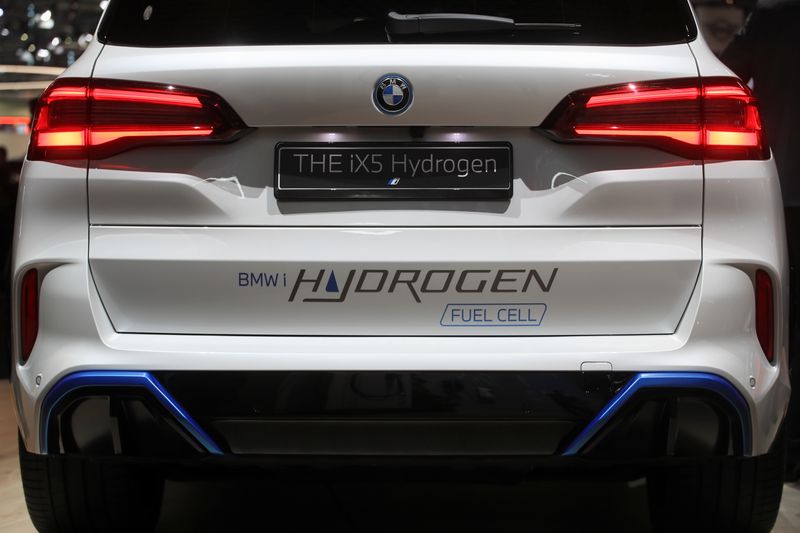German auto giants place their bets on hydrogen cars By Reuters

© Reuters. BMW iX5 Hydrogen is seen during Munich Auto Show, IAA Mobility 2021 in Munich, Germany, September 8, 2021. REUTERS/Wolfgang Rattay
By Nick Carey
MUNICH (Reuters) – Battery power may be the frontrunner to become the car technology of the future, but don’t rule out the underdog hydrogen.
That’s the view of some major automakers, including BMW and Audi, which are developing hydrogen fuel-cell passenger vehicle prototypes alongside their fleets of battery cars as part of preparations to abandon fossil fuels.
They are hedging their bets, calculating that a change in political winds could shift the balance towards hydrogen in an industry shaped by early-mover Tesla (NASDAQ:)’s decision to take the battery-powered road to clean cars.
Global auto hub Germany is in sharp focus. It is already betting billions on hydrogen fuel in sectors like steel and chemicals to meet climate targets, and closely-fought elections this month could see the Greens enter the coalition government and further push the technology.
BMW is hydrogen’s biggest proponent among Germany’s carmakers, charting a path to a mass-market model around 2030. The company also has one eye on shifting hydrogen policies in Europe and in China, the world’s largest car market.
The Munich-based premium player has developed a hydrogen prototype car based on its X5 SUV, in a project already partly funded by the German government.
Jürgen Guldner, the BMW vice president who heads up the hydrogen fuel-cell car programme, told Reuters the carmaker would build a test fleet of close to 100 cars in 2022.
“Whether this (technology) is driven by politics or demand, we will be ready with a product,” he said, adding that his team is already working to develop the next generation vehicles.
“We’re on the verge of getting there and we’re really convinced we’ll see a breakthrough in this decade,” he said.
VW’s premium Audi brand told Reuters it had assembled a team of more than 100 mechanics and engineers who were researching hydrogen fuel cells on behalf of the whole Volkswagen (DE:) group, and had built a few prototype cars.
HYDROGEN TOO COSTLY NOW
Hydrogen is viewed as a sure bet by the world’s biggest truckmakers, such as Daimler AG (DE:) unit Daimler (OTC:) Truck, Volvo Trucks and Hyundai, because batteries are too heavy for long-distance commercial vehicles.
Yet fuel cell technology – where hydrogen passes through a catalyst, producing electricity – is for now too costly for mass-market consumer cars. Cells are complex and contain expensive materials, and although refuelling is quicker than battery recharging, infrastructure is more scarce.
The fact that hydrogen is so far behind in the race to the affordable market also means even some champions of the technology, like Germany’s Greens, favour prioritising battery-powered passenger cars because they see them as the fastest way to reach their main goal of decarbonising transport.
The Greens do, however, back the use of hydrogen fuel…
Read More: German auto giants place their bets on hydrogen cars By Reuters
